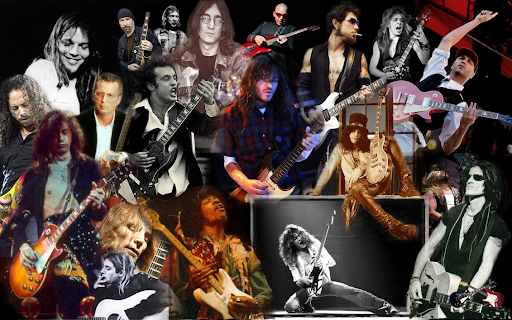
Rock N’ Roll is the genre most responsible for the music that we have today. Many genres of music have branched off from it, from simple Hard Rock, with bands such as AC/DC and Guns N’ Roses, to metal played by Metallica, Megadeth, and many others. There are way too many genres to count as descendants from Rock N’ Roll, but, it isn’t the music or the genres we are talking about today. It is actually the Guitarists behind the songs that make us want to start playing an air guitar. Those that keep the flow going before inevitably branching off into an almost entirely improvised guitar solo midway through the song that gives you a feeling that you didn’t have a few seconds prior.
Along with the history of the genre, many guitarists have cemented themselves as greats in its history, similar to how we remember the greatest athletes to play a sport. However, there is a big question of who out of all the legends really is the greatest. Unfortunately, there are just too many styles of playing to crown a single person as the greatest to ever touch a guitar. However, through several subcategories, you can get an idea of who the best guitarists are in the cornerstones of guitar playing. The cornerstones that will be discussed in this article are: Technical Mastery (who overall has the most skill in playing), Innovation and Impact (who most revolutionized the instrument), Songwriting (who wrote the most memorable music), and finally, Showmanship (who was best at being flashy and doing the most while performing).
Mr. McCleave teaches a class about the History of Rock N’ Roll which he describes as, “A class that looks at the history of American music and a primary focus on the music of the 20th century.”
Technical Mastery
The first category to discuss is technical mastery, or in the case of this article, who has the greatest overall mastery on the instrument, who can move up and down the fretboard the best, and who knows exactly what sound every playable note makes on the guitar. Guitarists such as Steve Vai fit in this category with their rigorous practice schedules and rhythmically complicated pieces.
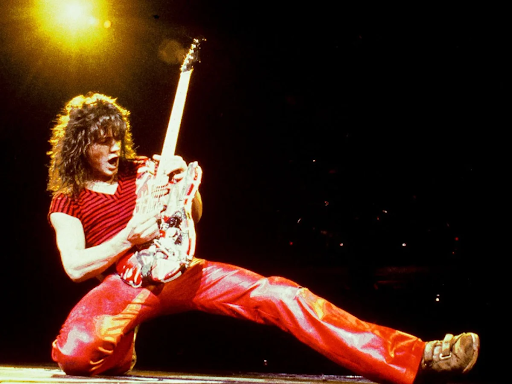
When asked, Mr. McCleave argued, “As far as technical ability, I go with Eddie Van Halen. He was just a monster on the guitar and was just doing things nobody else was doing, up and down the neck of the guitar with his famous Frankenstein guitar. And you can hear it, especially in the early albums like Van Halen, Van Halen II. You get the best of technicality from the raw technicality of Eddie Van Halen.”
Innovation
Innovation plays a crucial role in a band’s success because people are always looking for new music that will blow them away, and guitarists are always looking for new ways to play their instruments.
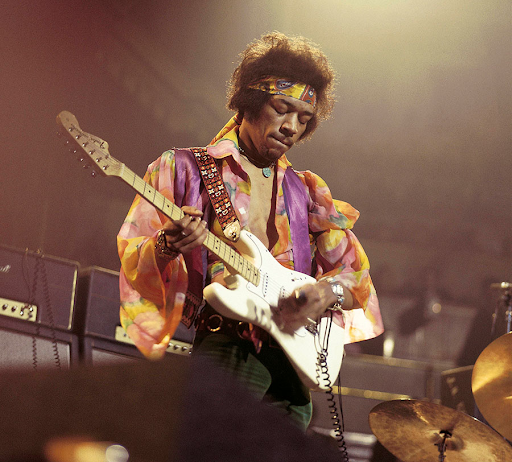
Not that it was ever a debate, but McCleave answered, “The best innovator is by far Jimi Hendrix. In less than four years of working as a paid musician, he changed everything. He took a Fender Stratocaster, flipped it upside down, and figured out how to play it left-handed. He set his guitars on fire for showmanship purposes. He made the blues psychedelic. Even just his style. The way he presented himself was very innovative. He was from a biracial family, so he didn’t fit into the white world or the black world. And so it was through Rock N’ Roll that he was able to start fitting in and he just did things with the guitar that nobody else was doing.”
Songwriting
Arguably, the most important category is songwriting. Most of the time, a band’s guitarist acts as the main songwriter. John Lennon, who is famous for his time as the Beatles guitarist and vocalist, wrote an estimated 83 songs for the band. He’s widely considered one of the greatest songwriters ever.
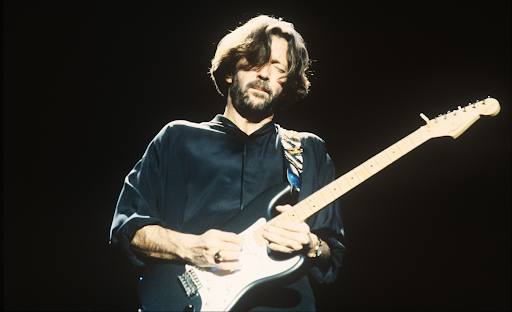
In Mr. McCleave’s opinion, “Eric Clapton is probably the greatest here, he has been writing songs for generations listening to the name of these bands that he was a part of, and he wrote songs for The Yardbirds, to John Mayall, and the Bluesbreakers, to Cream, to Blind Faith, then Delaney & Bonnie, Derek, and the Dominoes. And then, just decades of a solo career, he’s got a discography of songs that reach out to generations.”
Showmanship
The final category covered today will be showmanship (the ability to energize a crowd with guitar playing). Guitarists who act as the center of attention on the stage usually play the weirdest-looking guitars that have the loudest sound. They are usually doing something from start to finish in concert. McCleave’s take? None other than Led Zepplin’s Jimmy Page.
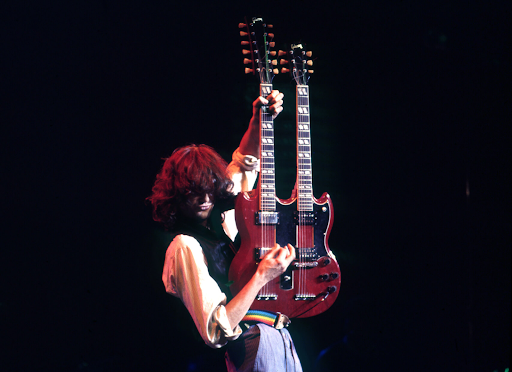
“I think he fits all of the criteria of good showmanship. He had the crazy guitars. He had the two-neck guitar. He had the the Gibson Les Paul and he would pull out the violin bow and play with it. And that’s showmanship in a nutshell.”
Overall, the picks here are good choices, and factually accurate, as they highlight a variety of great guitar players. There will likely never be a single definite answer for who’s the greatest guitarist of all time, but these categories help get close to determining the answer.
As for Mr. McCleave’s History of Rock N’ Roll class, “It’s different, and I make sure that it’s very different because I want students to take US history with me and then take History of Rock to not see the same thing.”
Coming from a former student in the class, it’s a fun one. If you need or want another class, History of Rock N’ Roll is a good way to go.







